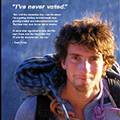
依方‧周依納德不僅是個世界級的登山家、他更是個堅愛衝浪的衝浪好手與飛神釣愛好者。但除了以活力及大膽的戶外運動精神著名外,他也是巴塔哥尼亞公司的創始人兼老闆,更以他前衛的企業策略在商場中闖出了一片天。周依納德出生於緬恩州,原本是位鐵匠;他創立了巴塔哥尼亞公司──一家專門供應頂級戶外用品的公司。令人欽佩的是,他無須讓公司上櫃,便使公司收入直達2億3千萬美金。現年60餘歲的他,數十年以來一直依循著他對美國企業界一貫「不用我的方法就算了」的態度,使他得以帶領同事以及競爭者走向共同維護環境的理想。
巴塔哥尼亞是第一個使用有機棉製造衣物,第一個使用回收的汽水瓶蓋製造人工毛料,以及首位捐贈每年公司總收入1%給基層環保組織的大型零售公司。自此以後,這個舉動便引發了其他大公司,例如GAP、NIKE、Timberland等著名服飾商開始採用有機素材,並著手於減少環境污染的計畫。當然,巴塔哥尼亞仍然無法達到對環境造成零污染的理想。一個例子是:巴塔哥尼亞公司的主要製造工廠皆設於美國領土外,因此需要使用相當多的燃料才能將原料及產品運送到世界各地。
然而,過去幾個月以來,巴塔哥尼亞又創造了一個前所未有的創舉-即推動「50萬元將票投給環境」的活動,希望藉此鼓勵關心環境的民眾於11月2日投下神聖的一票(編按:美國總統大選)。周依納德在位於加州凡度拉的巴塔哥尼亞總公司接受了我們關於總統大選、推動公司運作環保化、為何他比比爾福特更具影響力、以及地球是即否將完蛋等議題進行訪問。
問:是什麼促使你推動「將票投給環境」的活動?
答:嗯,昨晚我與耶穌對話時(大笑),耶穌告訴我大家都搞錯了──他並不希望大家在北極圈野生動物保護區探油;我們把一切都搞砸了,需要從新探討我們的生活。
問:你能直接與耶穌溝通!他還說了些什麼?
答:嗯,他並不常跟我說話-他說話相當的簡短扼要。
你知道,我真的很失望沒有人在針對環境保護問題進行討論。縱使美國國防部已經站出來告訴民眾對美國國家安全最大的威脅之一是全球暖化,也很少人注意。你聽聽看這些(總統)辯論的內容-真的是蠢到令人無法置信!提出來的問體本身就很愚笨,答案也很愚蠢,不論是布希或凱利都沒有提出我們正要面對的重大且急迫的環保問題。這是很可悲的事。我希望環保問題可以在政治過程中佔更重要的位置。然而,這個問題在政治議題中卻只佔了5%。5%!對我而言,那真的是底線了。
問:讓我們再回到「將票投給環境」活動的相關細節上。我知道這個使命會啟發戶外愛好者去投票。你是如何招募投票者的?
答:我們協助他們在線上註冊並在我們的零售店要求他們,再考慮把票投給誰時,可以把環保擺在第一位。我們並沒有告訴任何人該選誰。
問:你為什麼沒有將活定命名為「不要投布希」?畢竟布希的環保政策相當不理想,甚致被批評擁有有史以來最不良的環保紀錄,而凱利有關環保的紀錄卻是相當被推從的。
答:這麼做就已經構成承犯法行為-依法而論,企業不應該為任何政治人物作背書或表示認可。對我而言,最重要的是請人們看看候選人對環保政策的紀錄,再以此自行做決定。
問:你能談談你自己對候選人的看法嗎?
答:在這裡不行-我現在代表的是巴塔哥尼亞公司。他們不會讓我好過的。(大笑)
問:但只要人稍微想一下哪一位候選人政策對環保較有利,答案不就相當明顯了嗎?
答:是這麼說沒錯,但這關係著不只是總統候選人-除了總統大選外,還有許多人準備要競選國會議員、市議員等。而我要說的是:請看看他們的環保紀錄,因為這比他們說的或做的都來的重要。
問:甚至比反恐戰爭、醫療、教育、所有的東西都重要?
答:是的,因為環保跟所有的議題幾乎都密切相關。我已經厭煩了這種社會-我談的並不是政治,而是社會-一個只治標不治本的社會。我們的醫療問題與環境息息相關。拿乳癌為例子-美國現在8個女人中有1位罹患乳癌;而第二次世界大戰戰後時,30位女性中才有1位。因此,這個現象一定跟環境有關。然而,對乳癌的研究只有3%是針對環境因素做探討的。他們現在只是想找出可以賺錢的治療方法。對於反恐戰爭也是相同的道理。我們並沒有釐清我們之所以跟中東有衝突的原因,即是對資源的依賴;我們只是在治療症狀罷了。
我發現關心環境的人基本上是比不在乎環保的人來得誠實。我覺得你可以信任他們。如果你可以把票投給一位擁有絕佳環保投票紀錄的國會議員,或是另一位只有10%投票紀錄的人,我相信那位只有10%(投票紀錄)的人,很快就要被起訴了。
問:你的顧客對這個活動有哪些回應?
答:我們已收到上百封關於這個活動的電子郵件,而超過50%的回應是負面的。我收到很多顧客的信;他們相當憤怒,因為他們認為我們公司政治化了,並試圖告訴顧客他們該想什麼,做什麼。
我這裡有一封:「上帝以這塊土地作為我們的禮物,並賦予我們自主權。那隱含的意思就是把它使用到一定的程度,並造成污染。上帝亦告訴我們不要崇拜偶像。一個純淨的大地意像,對於許多人已是準偶像了。因此對於環保而言,我們有一種變質的傲慢,甚至是一種負面的影響」。
問:那個人的耶穌肯定跟你的不是同一位!發現你那麼多顧客是反環保的,你會不會感到很驚訝?
答:這的確令人感到驚訝,但並不是驚恐。我其實並不在乎。我可以收到10,000封要求要「把我的地址從你們的顧客通訊錄中刪掉」的信,我也不會有特別的感覺。如果你沒有收到這些信,那表示你不夠努力-這就是我的看法。
他們不了解的是:我從事這門行業並不是為了要製造衣服。天啊,我從事這門行業也不是為了給自己賺更多的錢。巴塔哥尼亞公司存在的目的是為了實行我在書中看到關於如何避免環境崩潰危機的建議。這才是我做這一行的原因-試著要改善我們自己的做事方式,並藉此去影響其他公司,讓他們也做正確的決策,也使我們的顧客去做正確的選擇。所以,我們並不會因此而改變。他們如果無法接受,那他們可以去買別的廠商的產品。
問:將票投給環境的活動將如何影響你的行銷?
答:這個活動動已經造成很大的正面影響了。我們因為這個活動,使得我們的曝光率大大提升,因為我們扮演的是領導者的角色,有許多社論把我們當討論的對象。許多雜誌也提供我們免費的廣告版面。目前為止,我們並沒有影響行銷方面的確切數據-現在時機仍然太早-但我們知道這確實對投票人註冊有影響。我估計大約有 100,000 未投過票的人,會因為我們的活動而去註冊。
問:如果你能在沒有明確政黨導向的州中,拉到足夠的環保票,這足以影響整個的選舉的結果。
答:那指的是沒有投過票的新投票者而言。我們並不會試圖改變任何已經下定決心的人的意見。但是大約20%的未婚女子從未投過票。那是相當可觀的一群投票者。
問:把票投給環境將許多類似巴阿塔哥尼亞用來推銷產品的商業手段,運用到推銷政治的層面上。政治界是否可以從企業界學習到一些行銷的實際知識?
答:可以的。當我看這些政治人物是如何推銷自己時,我會想:我的天阿!拜託,這真的很悲哀。你看看凱利穿西裝打領帶,配上一件挺拔的白襯衫,對著 一群車工人演講。這時你想:哦,天阿,他的衣服是誰幫他挑的阿?凱利需要做的,便是去釣釣鱸魚,和多參加全美汽車比賽協會的賽車活動,讓人感受他的親和力。
問:你認為哪些環保問題是下一位總統最需要注意的?
答:其實,我是一位悲觀主義者。說實在的,我覺得以一個社會而言,我們快完蛋了。我並不知道問題將出於水資源與表土的匱乏,或是疾病,或是為爭奪資源而永無止境的戰爭。以色列人絕對不會放棄他們在西岸所佔領的土地;那是水資源所在地。這一切都是關於資源和領土;而且這將會帶來很多衝突。以上任何一件事都可能造成重大的危機,也可能全部同時發生。然而,當你談到經濟時,現在的經濟狀況非常不穩定,是因為它被建立在我們不斷的消耗並丟棄不能再生資源的習慣上。我們不能這樣無止盡走的下去。人們感到不安,是有原因的。
問:你認為以賺錢為目的的企業領導者是否根本無法在任何具爭議性的議題上表達意見,因為如此可能會傷害到他們的企業基礎與產銷結果?
答:首先,如果他們是上市的公司,便什麼都不能做-因為他們必須對股東負責。巴塔哥尼亞是沒有上櫃的公司,而唯一擁有這家公司股權的人是我與我太太。因此,我們想做什麼就可以做什麼。但是,你若是上市公司的總裁,你必須接受董事會的指示,而董事會亦是受股東的意思行事。因此,你無法有機會在任何具爭議的議題上自做主張。比爾‧福特說他是個環保家,因此我相信他內心深處,一定覺得他並不應該製造休旅車。他不應該被股東的意見所牽絆。然而,他不能這麼做。他沒有那個權力。與比爾‧福特比起來,我的權力大多了。(待續)
Yvon Chouinard, world-class mountaineer, diehard surfer, obsessive fly fisher -- oh yes, and founder and owner of Patagonia -- is as famous for his brio and gutsy outdoorsmanship as he is for his visionary business strategy. A Maine-born blacksmith, Chouinard has built Patagonia, a purveyor of top-quality outdoor goods, into a $230 million company without taking it public. Now in his mid 60s, he has for decades maintained a tireless my-way-or-the-highway attitude toward corporate America that has helped him nudge both colleagues and competitors in the direction of sustainability.
Patagonia was the first major retail company to switch all its cotton clothing over to organic, the first to make fleece from recycled soda-pop bottles, and the first to pledge 1 percent of its annual sales to grassroots environmental organizations. It has since touched off a trend that has big-name brands such as the Gap, Levi's, Nike, and Timberland incorporating organic materials into their products and taking steps to minimize environmental harm. Of course, Patagonia is not entirely free of environmental fault. For one, the multinational company does much of its manufacturing overseas, and therefore must burn a fair amount of fuel to transport its materials and products around the globe.
But in the past several months, Patagonia has scored another notable first -- launching the half-a-million-dollar Vote the Environment project to rally outdoor enthusiasts to the polls on Nov. 2. Chouinard spoke with Grist from his Patagonia headquarters in Ventura, Calif., about the presidential campaign, the challenges of pushing a business toward sustainability, why he's more powerful than Bill Ford, and whether the planet is toast.
Q: What motivated you to launch Patagonia's Vote the Environment campaign?
A: Well, I was talking to Jesus last night [laughter] and He told me that everybody's got it all wrong -- that He really doesn't want us to drill in the Arctic National Wildlife Refuge for oil, that we're screwing everything up and we need to live a more examined life.
Q: You've got a direct line to Jesus! What else did He say?
A: Well, He doesn't talk to me very often -- He was pretty brief.
You know, I'm just so disappointed that there's nobody talking about the environment. Even though the Pentagon itself has come out and said that one of the biggest threats to American security is global warming. You listen to these [presidential] debates -- they're so stupid they're unbelievable. The questions are stupid and the answers are stupid and nobody's talking about the massive environmental problems we're facing, whether it's Bush or Kerry. It's a sad deal. I want the environment to be a much bigger part of the political process. It only occupies 5 percent of the political agenda. Five percent! And to me it really is the bottom line.
Q: Let's get back to the details of the Vote the Environment campaign. I know the mission is to inspire outdoor enthusiasts to get out there and vote. How are you recruiting voters?
A: We're helping voters register online and at our retail stores and asking them to make the environment their No. 1 priority. We're not telling anybody how to vote.
Q: Why aren't you calling it the Vote Against Bush campaign, given that Bush is widely criticized as having the worst environmental record in history while Kerry's environmental record is widely applauded?
A: Legally we can't -- corporations are supposed to stay out of the endorsement game. And for me, all that matters is really to tell people to look at each candidate's environmental record and decide for themselves.
Q: Can you talk about your own opinions about the candidates?
A: Not in this context -- I'm a representative of Patagonia. They'll nail me. [Laughter.]
Q: But if anyone took even one minute to try and figure out which presidential candidate represents the environmental vote, it would be obvious who that is, wouldn't it?
A: Yes, but it's not just the presidential candidates -- there are a lot of people who are running for Congress and the Senate and city council races and all kinds of stuff. And I'm saying look at their environmental records because it's more important than anything else they say or do.
Q: More important than the war, health care, education, everything?
A: Yes, in that it's deeply connected to almost every one of those issues. I'm sick and tired of a society -- I'm not talking about politics, I'm talking about a society -- that is only dealing with symptoms of a problem and not the root cause. Our health-care problems are deeply connected to the environment. Consider breast cancer -- you've got one in eight American women who are going to get breast cancer, that's up from one out of 30 right after World War II, so there's got to be an environmental cause to it. And yet only 3 percent of cancer research funding goes to trying to find the environmental causes. They're trying to find treatments so they can make money off of it. The same thing goes for our so-called War on Terror. We're not looking at the root cause of our conflict with the Middle East, resource dependency; we're treating the symptoms.
I find that people concerned about the environment tend to be a lot more honest than people who aren't. I think you can trust them. If you are voting for a congressman who has a really good voting record on the environment and the other guy who's got a 10 percent [voting record], let me tell you I think that 10 percent guy is probably going to get indicted for something pretty soon.
Q: What kind of feedback have you gotten from your customers about this campaign?
A: We've gotten hundreds of email responses on the campaign and more than 50 percent aren't happy. I got lots of letters back from our customers really angry at us for getting political and telling them, they think, what to do.
I have one of the letters right here: "We are given the gift of our land by God in which to have dominion. That means to use and to a degree pollute. We are also called by God not to worship idols. The notion of a largely untouched pristine environment has become a quasi-religious idol for many. Hence with regard to environmentalism we have a distorted hubris, even dark influence."
Q: That guy must be talking to a different Jesus than the one you're talking to! Is it alarming to discover that so many of your customers are anti-environmentalism?
A: It's surprising, not alarming. I couldn't care less. I could get 10,000 letters saying "Take me off your mailing list" and it wouldn't bother me. If you're not getting those letters, you're not trying hard enough. That's the way I see it.
What they don't realize is that I'm not in the business to make clothes. I'm not in the business to make more money for myself, for Christ's sake. This is the reason Patagonia exists -- to put into action the recommendations I read about in books to avoid environmental collapse. That's the reason I'm in business -- to try to clean up our own act, and try to influence other companies to do the right thing, and try to influence our customers to do the right thing. So we're not going to change. They can go buy from somewhere else if they don't like it.
Q: What will be the effect of the Vote the Environment campaign on your sales?
A: It's already having a huge effect on the good side. We're getting so much publicity off of it, a lot of editorials because we've taken a leadership position. Magazines have given us free ads. We can't tell exactly how it's affecting our sales yet in terms of numbers -- it's too early -- but we do know it's having an effect on registration. My estimate so far is that we're going to get 100,000 people to register that have never voted before.
Q: That's enough to tip the election if you pull in pro-environment votes in the right swing states.
A: That's new voters. We're not going to change anybody's mind who's already made up their mind. But something like 20 percent of single women have never voted. That's a huge constituency.
Q: Your Vote the Environment campaign is applying the same marketing strategies to politics as Patagonia does to sell its products. Could the political world stand to learn some marketing savvy from the corporate world?
A: Yeah. When I look at how these guys are marketing themselves, the politicians, I'm thinking, Oh my God! Oh man, this is pathetic! You see Kerry out there with a coat, tie, and a starched shirt giving a speech to a bunch of autoworkers and you think, Oh my God, who dressed this guy? All Kerry has to do is go bass fishing and go to NASCAR races to loosen up his image
Q: What do you think are the environmental problems that the next president should be most concerned about?
A: Well, I'm a real pessimist. I think as a society we're toast, to tell you the truth. I don't know whether it's going to be running out of water or topsoil, or disease, or endless wars being fought over resources. The Israelis are never going to give up the West Bank -- that's where all the water is. It's all about resources, it's all about territory, and it's going to be a lot of gnashing of teeth. And any one of these things could be deadly serious, or it could happen all at once. And when you talk about the economy, the economy is so shaky because it's based on all of us just consuming and discarding endlessly non-renewable resources and you can't do that forever. There's good reason for people to feel insecure.
Q: Do you think that corporate leaders who are in business to make money simply can't take a stand on any controversial causes because it might hurt their bottom line?
A: First of all, if they're a public company they can't do anything -- they're beholden to their shareholders. Patagonia is a private company, and the sole stockholders are me and my wife, so we can do anything we want. But if you're CEO of a public company, the board of directors tells you what to do, and the stockholders tell the board of directors what to do, so there's no way you can take a stance on anything controversial. Bill Ford says he's an environmentalist, so deep down in his heart I'm sure he believes he shouldn't be making SUVs, period. He shouldn't allow the stockholders to tell him what to do. But he can't do it. He has no power. I have way more power than Bill Ford does. (to be continued...)
原文與圖片詳見:http://www.grist.org/news/maindish/2004/10/22/little-chouinard/
版權歸屬Grist Magazine




